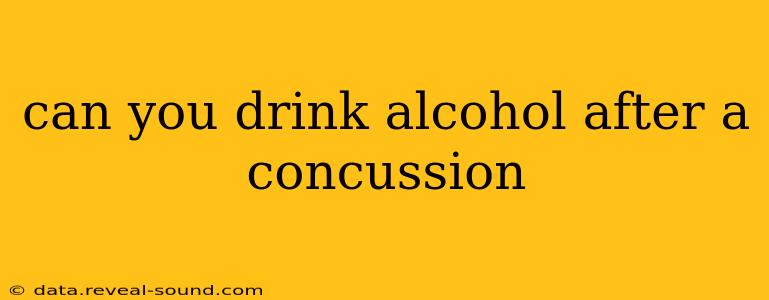Can You Drink Alcohol After a Concussion? A Definitive Guide
A concussion, a type of traumatic brain injury (TBI), disrupts the normal function of your brain. While recovering from a concussion, your brain needs time and rest to heal. Therefore, the simple answer is no, you should not drink alcohol after a concussion. Alcohol can significantly hinder the recovery process and even worsen your symptoms.
This isn't just a recommendation; it's crucial for your health and well-being. Let's delve into the reasons why alcohol and concussions are a dangerous mix:
How Does Alcohol Affect Concussion Recovery?
Alcohol is a central nervous system depressant. This means it slows down brain activity. After a concussion, your brain is already compromised and working overtime to repair itself. Adding alcohol further slows down this crucial process, potentially leading to:
- Prolonged recovery time: Alcohol can significantly extend the duration of your concussion symptoms.
- Increased risk of complications: It can increase the risk of developing post-concussion syndrome (PCS), a condition characterized by persistent symptoms like headaches, dizziness, and cognitive difficulties that can last for weeks, months, or even years.
- Worsened symptoms: Existing symptoms like headaches, nausea, dizziness, and confusion can be amplified by alcohol consumption.
- Impaired cognitive function: Alcohol further impairs cognitive abilities like memory, concentration, and judgment, which are already affected by a concussion.
- Increased risk of re-injury: Alcohol can impair judgment and coordination, potentially leading to risky behavior that could result in a second concussion.
What are the Long-Term Effects of Alcohol Consumption After a Concussion?
The long-term consequences of drinking alcohol after a concussion are potentially severe. Research continues to uncover the full extent of the damage, but it's clear that alcohol consumption during recovery can:
- Increase the severity of long-term cognitive deficits.
- Contribute to the development or exacerbation of post-concussion syndrome (PCS).
- Increase the likelihood of experiencing chronic headaches and other persistent symptoms.
What Should I Drink Instead of Alcohol After a Concussion?
Hydration is key to concussion recovery. Stick to plenty of water, clear broths, and electrolyte drinks. These help your body replenish fluids lost during the injury and support optimal brain function. Avoid caffeinated beverages, as caffeine can exacerbate some concussion symptoms.
How Long Should I Avoid Alcohol After a Concussion?
There's no magic number of days or weeks. The best advice is to avoid alcohol entirely until you have been cleared by a healthcare professional. This typically involves a neurological examination and assessment of your symptoms. Your doctor will determine when it's safe to resume alcohol consumption based on your individual recovery progress.
Can I Take Over-the-Counter Pain Relievers With Alcohol After a Concussion?
No, it is strongly advised against combining over-the-counter pain relievers (like ibuprofen or acetaminophen) with alcohol after a concussion. This combination can place additional stress on your liver and increase the risk of adverse side effects. Always follow the instructions on the medication label and consult your doctor or pharmacist before taking any medication, especially after a head injury.
What other things should I avoid after a concussion?
Besides alcohol, other substances and activities to avoid include:
- Driving: Impaired reaction time and judgment make driving extremely dangerous after a concussion.
- Contact sports or strenuous physical activity: These activities can increase the risk of re-injury.
- Screen time: Excessive screen time can exacerbate symptoms.
- Other drugs or medications: Without consulting your doctor first.
Remember, recovering from a concussion requires patience and prioritization of your brain health. Abstaining from alcohol is a crucial step in ensuring a safe and complete recovery. Always consult with your doctor or other qualified healthcare professional for personalized advice and guidance. They can provide the most accurate and up-to-date information regarding your specific situation.
